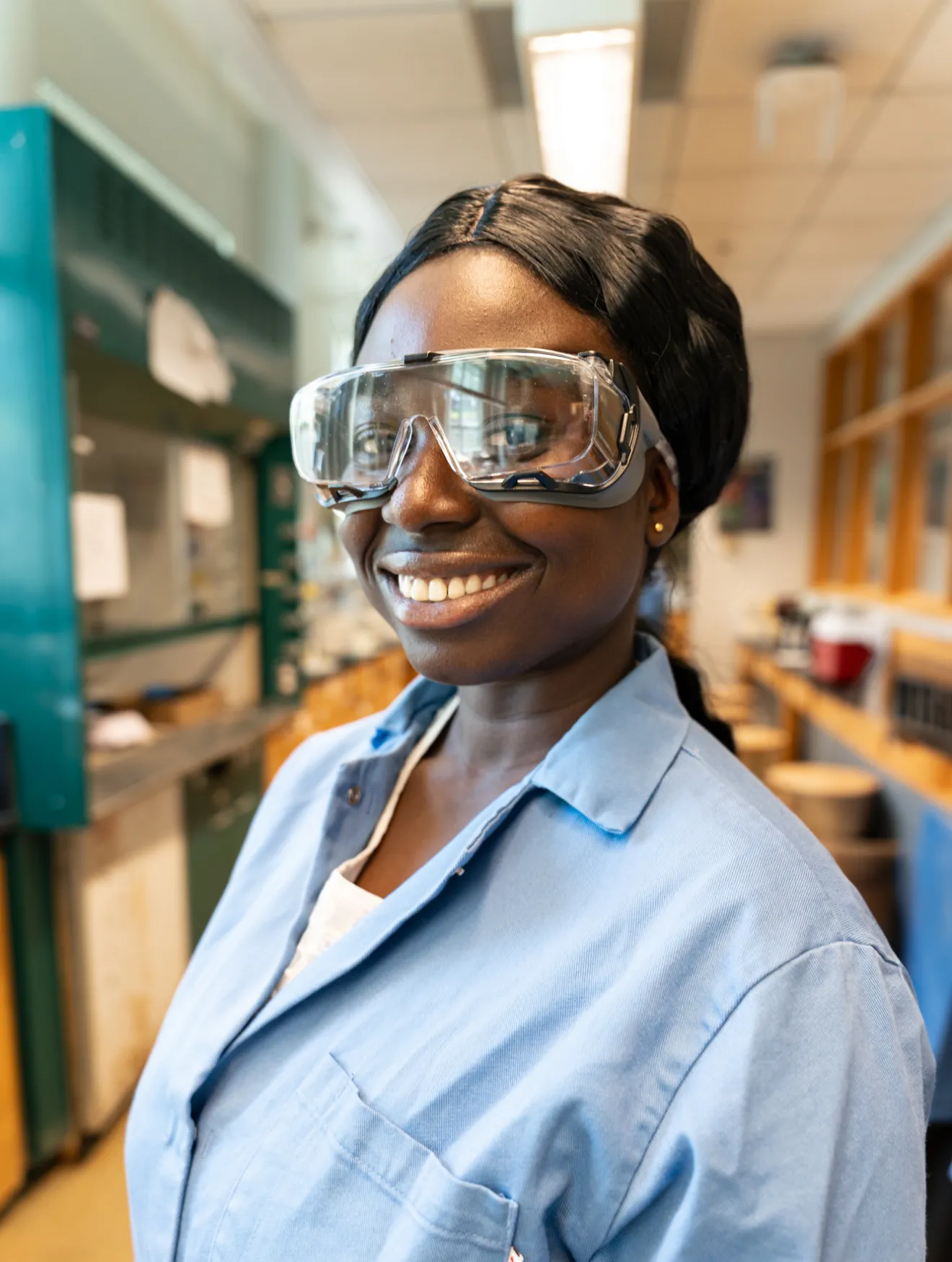
When Mabel Frimpong '27 was in 5th grade in Ghana, a young girl had a seizure while visiting her school. She was surprised when some students told her to avoid the girl, because they saw seizures as a spiritual disease, almost a curse. She was more surprised when her parents echoed that warning.
“It was my very first time seeing something like that, and everybody was like, ‘Don't go near them—if you go near them, it can be transferred to you.’ I was so scared,” she says.
“That really intrigued my curiosity, I really wanted to know more about it from that very instant.”
Now a neuroscience major at Bryn Mawr, Frimpong wants to know more about the nature of neuro-related conditions and diseases, and how they could be treated.
She recently won the competitive American Cancer Society summer internship to screen for preleukemia in Down syndrome and Latino/Hispanic newborns, as well as a hybrid fall internship focused on pediatric epilepsy research with the Loddenkemper Research Laboratory at Boston Children’s Hospital.
Frimpong is looking forward to medical school after Bryn Mawr, hoping to eventually become a neurologist. She has already published her first peer-reviewed study in the journal Brain and Spine.
“In Ghana, diseases associated with the central nervous system are often regarded as spiritual, especially epilepsy, so I always wanted to learn more about it and know what really goes on, and not just follow the social misconceptions,” she says.
Although she is the first in her family to go to college, Frimpong said her family—and the country of Ghana in general—encouraged her interest in medicine and science. Several high schools specifically empower women to pursue STEM fields, and there is an annual high school science and math competition that brings the entire nation together.
"You find people from all over the country coming together, rooting for their schools—the whole country comes together and it’s like the Africa Cup of Nations,” she says, adding that she still enjoys it to this day.
When Frimpong started looking at colleges, she told her counselor she wanted a similar experience, someplace “where women's empowerment is really taken seriously,” she says. Her counselor recommended Bryn Mawr.
Coming to the United States for the first time and arriving at the campus was a bit of a shock in several ways, she says. She wasn’t used to the cultural norm of opening doors for the person behind you, for example. And then there was the snow, which she had just seen in the movies.
“My first snow happened when I was in my Spanish class, and I was just looking through the window, and it was just amazing,” she says. “I made a snowman. I had waited all my life to build a snowman, and finally I was able to make one and I took a picture and stuck a Ghana flag in it.”
Frimpong says she knew, even before coming to campus, that she wanted medical mentors to help guide her through the challenging and competitive medical school path.
Using LinkedIn, she found people in her field of interest and reached out to Dr. Wireko Andrew Awuah, a medical student at the time, and co-founder of ICORMEd Collaborative, a research group formed by medical students. At first, she was discouraged when he told her she needed to wait a year and take some writing classes before assigning her to a research team, but now she sees the improvement in both her writing and research abilities.
“Classes exposed me to resources on campus, like using the online library to access articles, how to write on a college level and how to cite sources,” she says. “When I was going through all the research and publications, I realized how much I needed to know before I could actually begin the journey.”
Frimpong took introductory biology courses with Professor Tamara Davis and Senior Lecturer Jennifer Skirkanich, which exposed her to genetics and how genomic abnormalities can lead to many neuro-related conditions, the concept of regeneration of various stem cells, and the idea that neural stem cells cannot regenerate.
“All of this fascinates me and makes me want to explore neuroscience and neurology further,” she says.
Frimpong’s article focuses on the use of chromosomal microarray analysis (CMA) in neurology and neurosurgery. CMA is a genetic test that evaluates DNA to detect missing or duplicate factors that can cause disorders such as autism. Frimpong searched for relevant articles on the research topic, wrote the introduction, helped edit the article, and copy-edited the chronology of the citations.
She said she was particularly interested in using CMA to diagnose neurological conditions before they progress to larger issues, and she hoped to incorporate those insights into future work on epilepsy.
“If there is a technology that will be able to help us detect that and have preventive measures for epilepsy, then it's really great,” she says.
As she’s working toward that goal here in the U.S., Frimpong continues to help those back home. Last year, she started a non-profit health advocacy group, Ako Health Foundation, that educates people about genetic diseases, such as diabetes and epilepsy, addresses misinformation, and encourages people to seek treatment.
“People sometimes see them as curse in a family, and often don't really see the medical connection they need to see—they’ve just accepted it that this is what we have in the family, and we can't do much about it,” she says. “So, I’m going out there to educate people that these are actually diseases that can be cured, that have been researched, and that we have health providers that can help manage them or cure them.”
